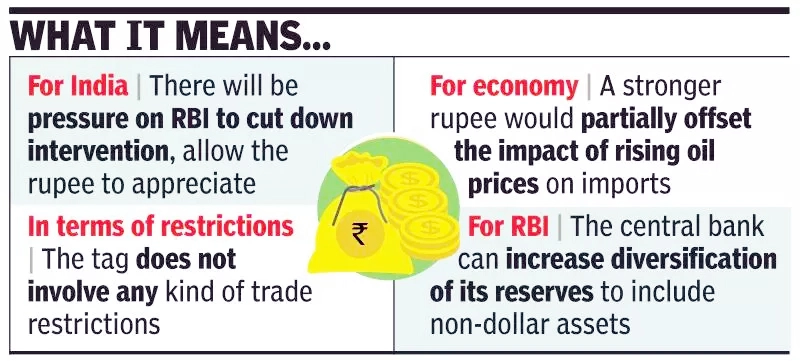India in US Currency Practices Monitoring List | 17 Apr 2021
Why in News
Recently, the United States (US) placed 11 countries, including India in the Currency Practices Monitoring List (Currency Manipulators Watch List).
- India was on the list in the December 2020 report as well. In 2019, the US Treasury Department had removed India from its currency manipulator watch list of major trading partners.
Key Points
- Currency Manipulators:
- This is a label given by the US government to countries it feels are engaging in “unfair currency practices” by deliberately devaluing their currency against the dollar.
- The practice would mean that the country in question is artificially lowering the value of its currency to gain an unfair advantage over others.
- This is because the devaluation would reduce the cost of exports from that country and artificially show a reduction in trade deficits as a result.
- Currency Manipulator Watch List:
- The US Department of Treasury releases the semi-annual report where it has to track developments in international economies and inspect foreign exchange rates.
- It reviews currency practices of the US’ 20 biggest trading partners.
- The US Department of Treasury releases the semi-annual report where it has to track developments in international economies and inspect foreign exchange rates.
- Criteria:
- An economy meeting two of the three criteria in the Trade Facilitation and Trade Enforcement Act of 2015 is placed on the Watch List. This includes:
- A “significant” bilateral trade surplus with the US — one that is at least USD 20 billion over a 12-month period.
- A material current account surplus equivalent to at least 2% of Gross Domestic Product (GDP) over a 12-month period.
- “Persistent”, one-sided intervention — when net purchases of foreign currency totalling at least 2% of the country’s GDP over a 12 month period are conducted repeatedly, in at least six out of 12 months.
- Countries that meet all three of the criteria are labeled as currency manipulators by the Treasury.
- An economy meeting two of the three criteria in the Trade Facilitation and Trade Enforcement Act of 2015 is placed on the Watch List. This includes:
- Current List:
- Countries on the List:
- The other 10 countries on the list with India that merit “close attention to their currency practices” are China, Japan, Korea, Germany, Ireland, Italy, Malaysia, Singapore, Thailand, and Mexico.
- Questionable Chinese Growth:
- The Chinese economic growth in 2020 exceeded that of other large economies but has been driven by the early resumption of manufacturing and increased external demand, especially for medical supplies, personal protection equipment and electronics.
- Questions remain about the continued strength of the Chinese recovery absent a sustained increase in household consumption.
- China's failure to publish foreign exchange intervention and lack of transparency of its exchange rate mechanism and the activities of state-owned banks warrant close monitoring of renminbi (China’s currency) developments going forward.
- Countries on the List:
- India’s Status:
- India met two of the three criteria that is the trade surplus criterion and the “persistent, one-sided intervention” criterion.
- Consequence:
- Inclusion in the list does not subject to any kind of penalty and sanctions but it deteriorates the global financial image of the country in the financial markets in terms of foreign exchange policies including undervaluation of currencies to gain export advantages.

